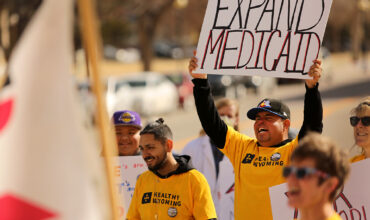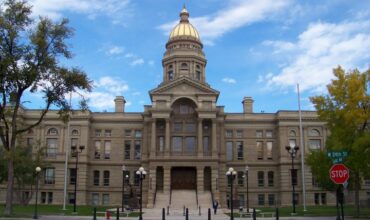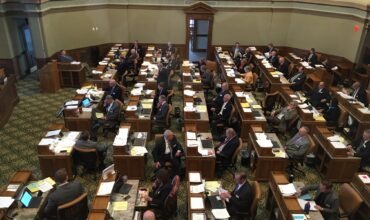More than 20 years ago, the Wyoming Legislature recognized a problem: the state needed more doctors. To achieve this, the legislature formed a valuable partnership with the University of Washington School of Medicine to add the second “W” to the WWAMI (pronounced whammy) program, and bring world class medical education to the state. The acronym stands for “Wyoming, Washington, Alaska, Montana, and Idaho,” the five states that participate, and acts as the state medical school for each. Therefore, thanks to the state legislature, Wyoming residents have a path to become the state’s next generation of physicians.
This investment by Wyoming lawmakers has produced hundreds of physicians who then returned to care for Wyoming communities. As the Wyoming WWAMI Class of 2025, we believe it’s time for the Legislature to make another decision to improve healthcare access in Wyoming: expanding Medicaid.
WWAMI provides Wyoming students with a top-notch medical education, and also meets the Legislature’s original goal: significantly increase the number of physicians working throughout our rural state.
“Medicaid expansion would increase insurance coverage and create jobs. As Wyoming’s future physicians, we welcome this boost to the state’s healthcare industry, as many Wyoming hospitals and clinics are currently struggling with staffing shortages and financial problems.”
Expanding Medicaid also serves the goal of improving Wyoming healthcare, particularly in rural areas. It would increase health insurance coverage for an estimated 19,000 Wyomingites. Most of the folks who would be eligible for coverage under expanded Medicaid work jobs that do not provide insurance, and earn too little to afford coverage from the federal marketplace.
Medicaid expansion has been shown to lower maternal mortality rates and increase overall health outcomes after it’s implemented. Additionally, an estimated 1,900 jobs would be created in Wyoming, as well as result in an increase of $1.5 billion to the state economy after expansion.
As Wyoming’s future physicians, we welcome this boost to the state’s healthcare industry, as many Wyoming hospitals and clinics are currently struggling with staffing shortages and financial problems.
The economic impacts are especially important to hospitals in rural communities. The Wyoming Hospital Association reports its members spend at least $100 million annually in “uncompensated care.” This means that the recipient can not afford to pay, so the hospital just bites the bullet. Furthermore, uninsured patients who can’t afford to pay often wait until a condition is life-threatening before seeking care. Medicaid expansion would allow qualified individuals to seek compensated care before a condition becomes life-threatening, with the federal government paying 90 percent of the bill.
Currently hospitals across Wyoming are being forced to close services, such as maternity wards, to balance for the costs of uncompensated care. This affects all residents in a community, regardless of insurance status. Wyoming must both invest in training OB physicians, and in keeping labor & delivery services open throughout the state.
Many of our fellow students are passionate about working with underserved patient populations. We believe that we should serve all Wyoming residents, regardless of their insurance status.
The main goal of the Wyoming WWAMI program is retention of doctors that go through the program. Many of us question why our state would want us to return to Wyoming to provide healthcare, while simultaneously leaving a barrier between the fruits of our education and Wyomingites who could benefit the most from it.
For our class, supporting Medicaid expansion isn’t a political stance, but one rooted in our interests in improving healthcare in our home state. However, it will take political action to get where we want to be.
Currently two-thirds of Wyomingites support Medicaid expansion, with majority support from Republicans, Democrats and Independents. It is time for our state lawmakers to act on behalf of their constituents.
We encourage you to look into the benefits that expanding Medicaid would bring to our state and find your local legislators at www.wyoleg.gov after the recent elections. Let them know it is an issue that is of great concern to you.
We also encourage you to contact the members of the Revenue Committee and express your support for moving the legislative process forward. Their support is a crucial step in making Medicaid expansion a reality.
Expanding Medicaid, like joining the WWAMI program, is an opportunity that the state of Wyoming cannot afford to pass up. The health and wellbeing of our communities are at stake.
Wyoming WWAMI entering class of 2021
Listed by hometown
- Afton: Carson Walker
- Buffalo: Scott Killian
- Casper: Tazle Markovich, Sara Martinez, Audrey Mossman, Colin O’Neill and Laura Stamp
- Cheyenne: Saul Alvarado
- Cody: Bethany Shotts
- Dubois: Kurt Leseberg
- Gillette: Brandon Izatt and Bailey Stuart
- Jackson: Matthew Rorke
- Laramie: Carter Eckhardt and Christopher Henry
- McKinnon: Brandon Young
- Powell: Tristan Bohlman
- Rock Springs: Hanna Ahuja and Jessica Garcia
- Wheatland: Samantha Britz




